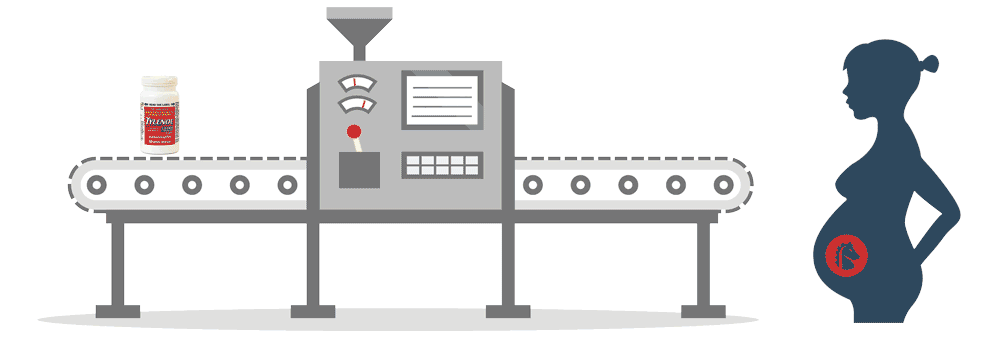Drugs and Pregnancy: What Is and Isn’t Safe?
Pregnancy is a very complex biological process, where a woman’s body undergoes drastic changes to accommodate the growing offspring inside her body. The use of drugs, whether legal or illegal, can have a significant impact (even a devastating one) on both the health of the fetus and the woman herself. This guide to drugs and pregnancy will explain how certain substances – everything from heroin to over-the-counter cold medicine – can play a role during gestation.
Mixing Drugs and Pregnancy
 Most people know that mixing illicit drugs and pregnancy is a bad idea, even without really knowing why. The American Pregnancy Association explains that a drug like marijuana – “relatively safe,” according to Science Reports – crosses the placenta and reaches the embryo within the womb. Some women smoke cannabis to cope with the morning sickness and mood swings of pregnancy, correlating with a greater acceptance of using the drug across society in general. The New York Times warns that this increasing tolerance is “outstripping [the] scientific understanding of its effects on human health,” particularly during pregnancy. Pregnant women who do consume marijuana assume that the cannabis they are taking poses minimal risk to their future children, but preliminary research suggests that the main psychoactive ingredient in marijuana (tetrahydrocannabinol, or THC) can harm the development, cognition, and birth weight of the fetus after passing through the placenta. An obstetrician at Denver Health Medical Center warns that even though there is an increased perception that cannabis use is safe, even within pregnancy, there is scarce data to show that it is.
Most people know that mixing illicit drugs and pregnancy is a bad idea, even without really knowing why. The American Pregnancy Association explains that a drug like marijuana – “relatively safe,” according to Science Reports – crosses the placenta and reaches the embryo within the womb. Some women smoke cannabis to cope with the morning sickness and mood swings of pregnancy, correlating with a greater acceptance of using the drug across society in general. The New York Times warns that this increasing tolerance is “outstripping [the] scientific understanding of its effects on human health,” particularly during pregnancy. Pregnant women who do consume marijuana assume that the cannabis they are taking poses minimal risk to their future children, but preliminary research suggests that the main psychoactive ingredient in marijuana (tetrahydrocannabinol, or THC) can harm the development, cognition, and birth weight of the fetus after passing through the placenta. An obstetrician at Denver Health Medical Center warns that even though there is an increased perception that cannabis use is safe, even within pregnancy, there is scarce data to show that it is.
The American Pregnancy Association warns expectant mothers that cannabis raises levels of carbon monoxide and carbon dioxide in the blood, cutting down on the baby’s supply of oxygen. Smoking marijuana during pregnancy increases the chance of miscarriage.
Cocaine and Heroin during Pregnancy
Similar to cannabis, cocaine can also cross the placenta and enter the baby’s circulation system. A study in the American Journal of Obstetrics and Gynecology found that women who used cocaine while they are pregnant are 33 percent more likely to have smaller, premature babies than women who did not use cocaine during pregnancy. Babies born to cocaine-using mothers are “[smaller] in weight, size and head circumference.”
They are also born with underdeveloped brains, and they have weak immune systems. Such babies are also at risk for long-term health problems, and they might struggle with slower learning and lower IQs as they get older. There is also the danger of those babies having higher rates of high blood pressure, heart disease, and early death.
Heroin is one of the most commonly used illegal drugs in America today, and as far back as 1981, the Western Journal of Medicine noted that heroin addiction during pregnancy had been linked to “several significant medical and obstetrical complications,” which can result in severe and long-lasting negative impact in babies. A heroin-using mother-to-be is at risk for malnutrition, venereal disease, problems with the lungs, hepatitis, and third-trimester bleeding, among other problems. Fetuses are in danger of fetal death, intrauterine growth restriction (the unborn baby is growing at a slower rate than is healthy), and being born with withdrawal symptoms, such as convulsions, fever and insomnia. Mothers who abuse heroin by way of needles are also at risk for contracting blood-borne infections, like HIV and hepatitis, which can be passed on to their unborn children.
Don’t let the devastating side effects of addiction go on for another day. If you or someone you love is struggling with addiction and are ready to start the treatment process, call us today at . Oxford Treatment Center, American Addiction Centers’ Mississippi drug rehab, is ready to help you get the treatment you need today.
Pregnancy and Over-the-Counter Medication
For many people, mixing pregnancy and illegal drugs is an easy red flag, but there is less knowledge about what happens when over-the-counter drugs, easily purchased at a grocery store, interact with a pregnant woman and her developing fetus.
To this point, the American Family Physician journal notes that “pregnant women commonly use over-the-counter medications.” OTC drugs make up around 60 percent of the medications used across America, and over 80 percent of pregnant women take over-the-counter or prescription drugs.
Most of these drugs are very safe, but a number can be harmful to the mother or her developing baby. Some drugs may go through different degrees of safety and risk based on the gestational age of the fetus. Around 10 percent of birth defects are the result of the baby’s mother using some kind of drug. Many cannot be evaluated in clinical trials because of the ethical problems inherent in deliberately exposing a fetus to risk. The journal clarifies that “the benefit of [all over-the counter medications used during pregnancy] should outweigh the risk to the fetus.”
The Accutane Controversy
The question of legitimate medications posing serious threats to pregnant women and their babies arose in the 1970s, with a drug called Accutane changing the commercial and regulatory landscape of prescribing drugs during pregnancy.
Accutane (generically known as isotretinoin) was originally manufactured as a cancer treatment, but discarded when tests showed it didn’t work as intended and instead was likely to cause birth defects. As a side note, researchers for the manufacturer (Hoffman-La Roche) noted that Accutane was very effective at treating severe acne. In 1975, two independent researchers discovered this fact for themselves and published a paper on the topic. Hoffman-La Roche resumed their work on isotretinoin, but made sure to exclude pregnant women from their clinical testing.
The Food & Drug Administration approved Accutane as an anti-acne drug in 1982, even as scientists expressed concern that the risk of birth defects that caused the drug to be abandoned in the first place were not addressed. However, Accutane was immediately popular with dermatologists, general practitioners, and patients who wanted relief from their chronic acne – especially pregnant women since some expecting mothers experience acne outbreaks in their first trimester.
Brain, Heart, and Face Deformities
But within one year of the drug going to market, birth defects were reported in the children of women who used isotretinoin. Despite Hoffman-La Roche sending warning letters and updating their labeling, and the filing of many lawsuits followed, Accutane consumption continued, as did the number of babies born with birth defects. In 1988, an FDA advisory committee reported that over a thousand babies had been born with “brain, heart and face deformities.” Additionally, there were over a thousand miscarriages caused by Accutane, and almost 7,000 women had to terminate their pregnancies.
Dermatologists and pharmaceutical representatives from Hoffman-La Roche tried to defend Accutane, but following recommendations from pediatricians and the Centers for Disease Control, the FDA limited the number of doctors who were authorized to prescribe Accutane and required patients to get a second medical opinion before they could receive an Accutane prescription. The FDA claimed it did not have the legal authority to restrict prescriptions overall, but it told Hoffman-La Roche to make their warnings about isotretinoin even more explicit, to issue doctors with informed consent forms when the doctors made the decision to prescribe Accutane and to conduct follow-up studies to determine if these steps ensured that pregnant women were no longer exposed to the drug.
The End of Accutane and Pregnancy Risk Factors
Ultimately, a precipitously low market share of only 5 percent, and prohibitively expensive legal decisions (a $25 million payout to a man who developed Crohn’s disease after taking Accutane for acne treatment), led Hoffman-La Roche to pull Accutane off its distribution line in 2009.
Accutane lives on in memory as one of the most dangerous drugs that ever made it to the consumer market, and it drew public and regulatory attention to ensuring that pregnant women (and their unborn children) are not exposed to undue risks when taking prescribed and/or over-the-counter medication. The decades-long Accutane controversy changed how the medical community (and its government watchdogs) approached the use of medications during pregnancy. In 1975, for example, the FDA created a list of pregnancy risk factors for all drugs marketed in America. There are five categories, ranging from A (where “studies have failed to demonstrate a risk to the fetus in the first trimester,” and no risk arose in later trimesters) to X (human and animal studies demonstrated “fetal abnormalities,” and “positive evidence of human fetal risk,” to the point where “the risks involved in use of the drug in pregnant women clearly outweigh potential benefits”).
Accutane lives on in memory as one of the most dangerous drugs that ever made it to the consumer market
Is Tylenol Safe during Pregnancy?
When it comes to drugs and pregnancy, questions like these have to be asked even about the most common and household-name drugs available. Science Alert, for example, writes of how Tylenol (also known as acetaminophen and paracetamol) is a universally popular drug used to treat everything from a headache to a fever. But in a study published in JAMA Pediatrics, obstetricians warn that taking acetaminophen during pregnancy increases the risks that children will be born with behavioral problems, such as ADHD, symptoms of autism, delayed language development skills, and asthma, according to WebMD.
This represents a significant change in prescribing practices. Historically, Tylenol was one of the only pain relievers that doctors recommended to pregnant women, to help them with some of the more physically uncomfortable aspects of their pregnancy. Even the CEO and executive vice president of the American College of Obstetricians and Gynecologists noted to WebMD that the JAMA Pediatrics study did not “prove” that the acetaminophen in Tylenol causes behavioral problems in children.
However, for some researchers, there is still too much of a risk. The associate professor of pediatrics at the University of Auckland cited a 2014 study that showed mounting evidence that connects prenatal maternal consumption of acetaminophen and behavioral problems.
The JAMA Pediatrics study surveyed almost 7,800 women about their Tylenol (or generic equivalent) consumption at 18 weeks and 32 weeks during their pregnancies, and again when their children had reached the age of 5. For the mothers who took acetaminophen during pregnancy, their children were 1.4 times more likely to have some behavioral issues and 1.3 times more likely to be hyperactive. Paternal Tylenol consumption was also taken into account, and fathers’ use of the drug was not linked with any increased risks of behavioral problems. For the researchers, this suggests that the risk of behavioral problems in children cannot be explained by other factors.
Evie Stergiakouli, the study’s author was satisfied that the evidence in her research proved a link between behavioral difficulties and Tylenol consumption in utero. She noted that “the increased risk is quite small,” and that her study did not look at how much acetaminophen the women consumed or for how long they took the Tylenol.
Stergiakouli referenced animal studies that show acetaminophen might lead to abnormal brain development in fetuses. The strongest link to behavioral problems seemed to arise when mothers took Tylenol during the third trimester, a period when the brain of the embryo is actively forming and growing.
Acetaminophen and Behavioral Disorders
The Consumer Healthcare Products Association said that the study found only associations between Tylenol consumption and behavioral problems and “has many limitations,” but there is widespread research that casts doubt on the once-ubiquitous use of the painkiller by pregnant women. The same study that reached the conclusion that children born to mothers who had consumed acetaminophen during their pregnancies had a 1.4 increased chance of developing hyperactivity and impulsivity symptoms also found that boys were more likely to develop autistic symptoms if their mothers took acetaminophen during pregnancy. Researchers also found a higher risk of behavioral problems in children whose mothers used more acetaminophen.
Another study, this one published in the International Journal of Epidemiology, showed a link between acetaminophen consumption during pregnancy and childhood asthma. The study of more than 53,000 children did not examine the amount of acetaminophen taken, but researchers found that all instances of surveyed mothers taking Tylenol for colds, flu, fever, and general pain and discomfort during their pregnancies led to a “modest association” of asthmatic symptoms developing in their children. The researchers behind the study noted that untreated pain was also connected with a higher chance of children getting asthma as they grew older.
Being Especially Cautious
The Food and Drug Administration agrees that Tylenol during pregnancy is not completely safe. The agency said that when it comes to the use of pain medicine during pregnancy (including acetaminophen), it is best that pregnant women, and women who want to get pregnant, talk to their doctor before using any kind of medication, whether prescription or over-the-counter. Pregnancy is “a time for special caution,” the FDA wrote, and given the confluence of biological and chemical changes that pregnancy brings, playing it safe is of paramount importance.
Other doctors concur. Aisling Murphy, an assistant clinical professor in maternal-fetal medicine with UCLA Obstetrics and Gynecology told WebMD that her rule of thumb for pregnant patients is to avoid medication when possible; instead, she encourages massages, hot or cold packs, or even sitting in a chair with good back support to relieve the back pain that comes with carrying a baby. When medication is needed, Murphy tells her patients to go for the lowest effective dose of the medicine for the shortest period of time possible.
Pregnancy and Allergy Medication
Allergies are a common frustration in daily life, and many women experience some range of allergic reactions during their pregnancies. For a small number of women, allergies can present serious health risks to themselves or their unborn child. Antihistamines are a type of drug that are commonly prescribed or sold over-the-counter for the treatment of allergies. There are many antihistamines sold under household names like Benadryl, Claritin, and Sudafed. The Bump writes that the health risks of taking antihistamines like Benadryl and Claritin during pregnancy appear to be low (to the point where a doctor may sometimes prescribe Benadryl to women who cannot sleep during their pregnancy or to treat symptoms of anxiety during pregnancy). Sudafed, on the other hand, should be avoided.
The Food and Drug Administration has given Benadryl category B status, which means that the drug does cross the placental barrier, but there are no known side effects to the fetus when this happens. Most of the studies done on this topic have only used animal subjects; no human testing has been done.
Doctors usually suggest that their pregnant patients take between 25 mg and 50 mg of an oral dose of Benadryl once every six hours during the first trimester (the exact dose may vary). However, pregnant women should not take more than 25 mg once every six hours during their second and third trimesters. Some research suggests that taking too much Benadryl in the first trimester can increase the chances of cleft lip or palate in the unborn child. Taking more than 150 mg per day can cause withdrawal symptoms in the baby.
Risks vs. Benefits
BabyMed explains that after decades of being encouraged, Sudafed (the brand name of pseudoephedrine, which is a combination of an antihistamine and a decongestant) has become an anti-allergy drug that is only offered to pregnant women following a “risks vs. benefits” discussion with their doctor. Pseudoephedrine has been found to affect developing blood vessels, causing those vessels to constrict (a similar effect caused by medicinal and recreational drugs).
If this happens to a fetus, there is a risk that it will lead to gastroschisis, a defect in the abdominal wall that allows the contents of the abdomen to protrude outside the body. This usually results in preterm birth, intrauterine growth restrictions, and cardiac problems that generally require surgery and long-term hospital stays. In 2002, the American Journal of Epidemiology published the results of a study that found children who had gastroschisis “had an increased risk of having been exposed to pseudoephedrine (Sudafed) during gestation.” The risk of developing gastroschisis was increased among infants whose mothers had taken both pseudoephedrine and acetaminophen.
According to the American College of Asthma, Allergy and Immunology, antihistamines are generally useful during pregnancy because they treat the nasal and eye symptoms of seasonal or constant allergic conjunctivitis, allergic rhinitis, itching, or eczema. Antihistamines are also helpful when a mother experiences anaphylaxis (allergic shock). ACAAI suggests that since allergies can affect a mother’s eating and sleeping habits, as well as her emotional wellbeing, “antihistamines may provide definite benefit during pregnancy.” However, outside of a medical emergency like anaphylaxis, the use of antihistamines should be weighed against any potential risk to the fetus.
Notwithstanding the relative safety of using Benadryl to counter allergy symptoms during pregnancy, ACAAI strongly recommends that expecting and to-be-expecting mothers consult with their doctors before taking any kind of medication.
Simethicone during Pregnancy
Some of the more uncomfortable aspects of pregnancy are the gassiness and bloating that occur. This is because the expecting mother’s body produces more of the progesterone hormone, which relaxes muscles throughout the body, including the digestive tract; this, in turn, slows down digestion, causing gassiness and bloating, which typically manifest as flatulence.
Passing gas normally happens many times a day, but during pregnancy, women may do so much more than usual. As the pregnancy develops, the growing uterus presses down on the abdominal cavity, which slows digestion down even further, making the feelings of bloat and gassiness all the stronger. For this reason, pregnant women sometimes experience heartburn or constipation, even if these conditions were never a problem before gestation.
Simethicone is a drug sold under brand names like Gas Relief, Mylanta Gas, Phazyme, and Flatulex. The drug works by breaking up gas bubbles in the stomach, providing relief from the abdominal discomfort. Since simethicone does not cross the placenta, it is safe to consume during pregnancy, and it can be taken while the mother is breastfeeding. However, doctors recommend dietary changes or other remedies before taking simethicone to relieve bloating. As always, a woman who is expecting a child or planning to get pregnant should consult with her doctor before taking any kind of medication.
Common Cold Medications
The wholesale changes brought about by pregnancy means an expecting mother’s immune system is also affected. This can mean that a cold or cough, naturally contracted, can feel worse or longer-lasting than it actually is. Despite the feelings of fatigue or general malaise, the symptoms of the cold or flu are not normally dangerous to the mother or her baby. Nonetheless, pregnant women should take extra steps to avoid exposing themselves to the usual ways of getting a cold and to treat a cold when they get it.
If these methods prove ineffective, then over-the-counter medications are an option, but Everyday Health cautions that all medicines – no matter how helpful or innocuous – should be kept to the utmost minimum during the first trimester. Elisa Ross, MD, an obstetrician and gynecologist on staff with the Cleveland Clinic in Ohio, further explains that in the first 12 weeks of pregnancy, “the baby is making its organs,” so if its mother doesn’t absolutely have to take a drug during that time, it would be best for the fetus if she didn’t. The early stages of pregnancy are the most sensitive, and even simple cough syrup can upset a very fine balance of biological development.
Better Cold Remedies during Pregnancy
If necessary, mothers should seek out medications that have the fewest number of ingredients. Most common cold medicines are a combination “one-size-fits-all” concoction that are designed to cover all symptoms. For most people, this is enough; for mothers, they should look for medications that offer the ingredient they need for the specific symptom, such as standalone cough suppressants or expectorants. Ross says that a pregnant woman should separate the ingredients and take the ones she needs at the usual adult dose. This rules out popular cold syrups like NyQuil, Robitussin DM, and Claritin-D.
With this in mind, common medicines like ibuprofen (Advil, Motrin) and aspirin should be avoided, especially during the first trimester. Herbal medicines or remedies should also be treated with caution; they are unregulated and not always reliably marketed, so it is difficult to know exactly what they contain and whether they’re safe in general, let alone for a developing fetus.
Dr. Ross suggests that pregnant women should not assume that their coughs and nasal congestion are signs of the common cold; an illness like swine flu, which presents with similar symptoms, can be very harmful for both the mother and her unborn child. Experiencing fever, muscle aches, and symptoms that last longer for 10 days should trigger a doctor’s visit. As with the question of all other drugs during pregnancy, a doctor should be consulted before anything is purchased.
Women expecting a child should consider getting a flu vaccination, which will protect both them and their babies for up to six months after delivery. The Centers for Disease Control and Prevention strongly recommends that pregnant women, and women who want to have a baby, are up-to-date on their vaccination schedule.
It’s Never Too Late to Get Help
American Addiction Centers (AAC) is committed to delivering original, truthful, accurate, unbiased, and medically current information. We strive to create content that is clear, concise, and easy to understand.
While we are unable to respond to your feedback directly, we'll use this information to improve our online help.



